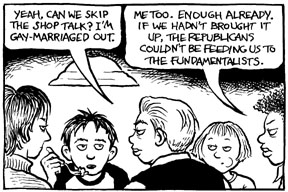Dyke to Watch Out for
 On April 26, Vermont became the first state to legalize civil unions between gays, granting same-gender couples all the rights of heterosexual marriage that a state has the power to extendA month ago, as the vote in the Vermont House neared, a small but fervent faction of defenders of "traditional" marriage simmered with moral outrage. When state Rep. Nancy Sheltra stumbled on a stack of Out In the Mountains, Vermont's gay monthly, in the halls of the State House, she found a target for her indignation. "It was left in the cafeteria where pages and touring children could see it," Sheltra said. The particular focus for her ire was the nationally syndicated cartoon Dykes To Watch Out For by fellow Vermonter Alison Bechdel.
On April 26, Vermont became the first state to legalize civil unions between gays, granting same-gender couples all the rights of heterosexual marriage that a state has the power to extendA month ago, as the vote in the Vermont House neared, a small but fervent faction of defenders of "traditional" marriage simmered with moral outrage. When state Rep. Nancy Sheltra stumbled on a stack of Out In the Mountains, Vermont's gay monthly, in the halls of the State House, she found a target for her indignation. "It was left in the cafeteria where pages and touring children could see it," Sheltra said. The particular focus for her ire was the nationally syndicated cartoon Dykes To Watch Out For by fellow Vermonter Alison Bechdel.
| Alongside sex, readers find familiar issues, from fat thighs to the war in Kosovo, or the dubious pleasures of a tofu-based diet. |
"I didn't read it," Sheltra admitted. Had the right-wing Republican
representative read it, she would probably have been as horrified by its politics as by its "sexual orientation."
Alongside sex in its richly bewildering blend of passion, jealousy, disappointment, tenderness and absurdity, readers find familiar issues, from the ridiculously petty to the profoundly disturbing: fat thighs, the war in Kosovo, day care, shopping, the demise of independent bookstores, the dubious pleasures of a tofu-based diet.
Bechdel, talking animatedly from the edge of her chair in the rural Vermont house she shares with her partner, describes the strip as "part soap opera, part editorial." In it she successfully juggles heady content with earthy humor. The main characters are as familiar, quirky, likable and irritating as old friends. Their flaws are usually endearing and always forgivable -- much like those of the occasionally heavy-handed cartoon itself.
Mo, the lead character and the conscience of the strip since it began in 1983, bears an undeniable resemblance to her creator. "I tried to disguise her . . . by giving her glasses and longer hair," Bechdel writes in a collection of essays and comics, The Indelible Alison Bechdel. "My success in this effort can be judged by how loudly people laugh when I tell them that."
Both Mo and her creator are given to careful examination of the political and ethical implications of even the smallest action. They are saved from tedious earnestness by an ironic overview and an under-current of wry self-deprecation. "[Mo] embodies all the values that I assumed were part of being a lesbian when I came out," she writes. "She's basically an anti-racist, anti-classist, anti-big business, anti-consumerist feminist socialist."
| "Look at all this rainbow crap. When did we turn from a political movement into a niche market?" |
Bechdel, 39, was born in central Pennsylvania where she grew up a classic tomboy. "Since earliest childhood," she confesses in her coming-out cartoon chronicle, "I knew I was different from other girls. For a long time, I thought it was because I was smarter." After an "astonishing revelation" in college, she realizes "the truth." "Now what?" is her first thought. "How do I get laid?"
During the 17 years Bechdel has been drawing the strip, readers have watched the characters fall in and out of love and lust, change jobs and take on various political and social causes. "I don't know why I even come to this march any more," laments the ever-earnest Mo at a 1995 gay pride parade. "Look at all this rainbow crap. When did we turn from a political movement into a niche market?"
Despite the satirical jabs, Bechdel takes gay politics seriously, both in the strip and in her real life. Before gay marriage sparked discussion in every media outlet, snowmobile club and health food store in the state, Bechdel was skeptical of its value. She viewed gays seeking state legitimacy for their unions as "assimilationist." "Why emulate a system that doesn't work?" she asks, as she inks a last cartoon for her new book, Post-Dykes To Watch Out For, to be released in May by Firebrand Books (www.firebrandbooks.com).
But she changed her mind after hearing the impassioned pleas for such mundane rights as the authority to make medical decisions for a sick partner, share in workplace benefits, and be able to refuse to testify in court against a partner.
 |
Bechdel is surprised by the openness of the current debate and the widespread support for gay rights in the state. "It made me feel as if a weight had been lifted that I didn't know was there," she says. "I went to the candlelight vigil on the State House lawn [the evening that the House passed the bill], and I felt for the first time like a citizen, I felt that the building stood for something."
| . |
| . |
| . |
| . |
| . |
| . |